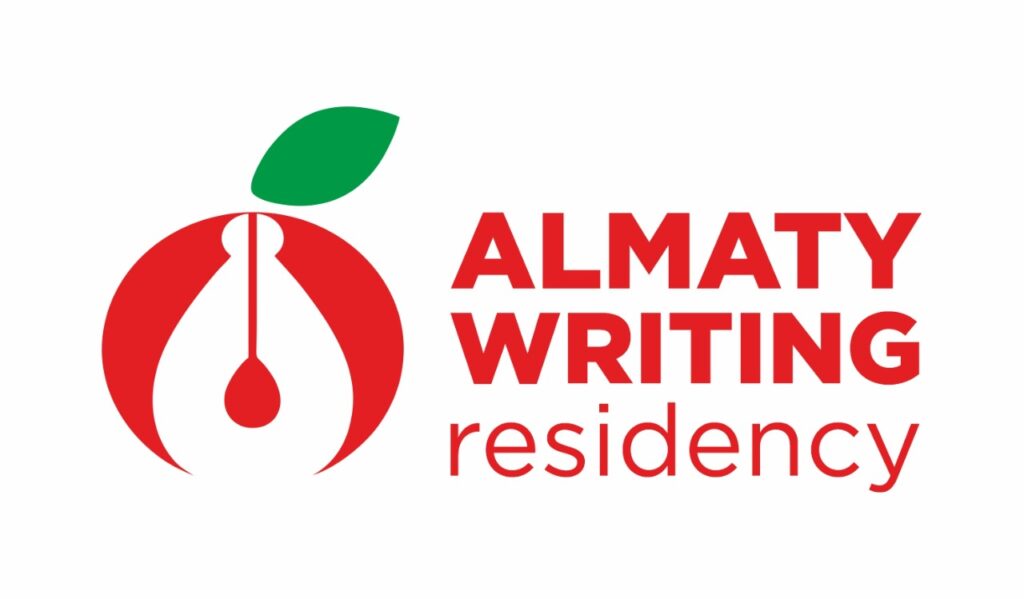Guest post by Teagan Klinkner

Picture by Zoya Falkova from “Illustrated guide”
After the fall of the Soviet Union, the Soviet Socialist Republics had to cope with the sudden lack of a literary publication system among the collapse of other institutional infrastructure. Kazakhstan has yet to fully establish its own framework for the distribution and publication of Kazakh stories. In their interview with the Alma Review, Kazakhstani writers Kseniya Rogozhnikova and Mikhail Zemskov elaborate on the state of contemporary literature in Kazakhstan. The couple explains the competition between Russian and Kazakh publishers, since the former typically attracts a larger audience they subsequently generate more funds as well. Despite the national language being Kazakh, the lasting impact of the Soviet Union created a bilingual population; with urban areas relying on Russian and rural areas speaking primarily Kazakh. This dynamic along with the trends of literary audiences have many Kazakh artists straying from their origins in order to break into the industry.
In our exploration into the contemporary literature of Kazakhstan the reality of this dual-language problem is continuously prevalent. While reading stories considered the “unofficial city texts” of Almaty (the central location of this program), we noted that many were originally written in Russian, not Kazakh. Simply put, the cultural mythology of Kazakhstan was not written in its native language. This situation would be analogous to a state like India having its literary canon written in English due to the British colonization of the country. Kseniya Rogozhnikova and Mikhail Zemskov are both native to Kazakhstan but started learning kazakh rather recently. However, couple mentions that they already can speak on the basic level. Moreover, Kseniya’s books that she ofthen writes with co-authors are mostly bilingual. Writing books in several languages is a direction many authors have gone in. Some however have published on a small scale solely in Kazakh. I was intrigued by the difference in details across stories written in English, Russian, and Russian/Kazakh. This post will focus on a brief comparison between story #14 by Denis Keen from The Illustrated Guide to the meanings of Almaty, Пастухи-близнецы (the Twin Shepards) by Yuri Serebryansky from Kazakhstani Fairytales, and Mängilik Jel (the Eternal Wind) by Anuar Duisenbinov from Metamorph. These texts are further explored in the book reviews by my fellow classmates so if these stories interest you please read their reviews as well!
Denis Keen was born and raised in the US, eventually moving to Almaty, Kazakhstan where he began to write about the city and its mythology. As the only story from The Illustrated Guide to be originally written in English it presents a unique foreign interpretation of the city. Keen’s story focuses on the individuality expressed in the single story cottage neighborhoods, posing a stark contrast to the skyscraping skyline presented to travelers in publicized documentation of the city’s design. These details, Keen argues: “will never be conquered,” as they survived the Soviet era and a push towards independent expression of nationality. As Kazakhstan has adopted new means of distinguishing itself from its former colonizer (such as changing the alphabet from the Russian cyrillic to Latin), forms of individualism such as the intricate external woodwork depicting traditional national patterns have become a vital symbol of what it means to be Qazaq rather than Kazakh.

The Illustration accompanying Serebryansky’s story “The Twin Shepherds”
Coming from Russian and Polish heritage, Kazakhstani writer Yuriy Serebryansky has a very different interpretation of Kazakhstan. Writing primarily in Russian, Serebriansky crafted a collection of tales which form a national folklore with many stories having references to specific areas of the country. Serebriansky’s work was published in Russian, and then translated into Kazakh and English; since he, like many Kazakhsani authors, he knows very little Kazakh. Exemplifying the language gap and the imagined audience for his work. However the exception in Kazakhstani Fairy Tales is the use of references which a person unfamiliar with Kazakhstan may struggle to visualize. The story Twin Shepards is one which derives from stories of the mountain range and details regarding Kazakh customs.
Resembling the story of Cain and Abel (minus the murder), the two brothers work professions related to their geographic position, both brothers pose dreams to a force larger than themselves, and one is granted his wish; the ending, albeit, is not as originally imagined by the one brother. This story illustrates the “origins” of the Kazakh yurt through references to the geographic features of the region, a religious belief of the Kazakhstani people, and details which note elements of Kazakh national costume. While Keen noticed the architectural aspects of an urban Kazakhstani city, Serebryansky describes the steppe, glacial trails, pastures, and the mountain range in a single story, illustrating the vast, geographically diverse state. The story contains the use of Russian words which would be foreign to a native Russian speaker outside of Kazakhstan. One brother wears a тюбетейка (tubeteika) which is a traditional central asian cap, this same brother was tending his flock in a жайляу (zhaylyau), the term for a summertime mountain pasture in Kazakhstan. These terms distinguish Serebryansky as a Kazakhstani writer who writes in Russian from a strictly Russian writer, yet still limits his audience to those who understand Russian.
Anuar Duisenbinov, unlike the aforementioned authors, is fluent in Kazakh and although his poems often integrate both Kazakh and Russian his intention is to bring the Kazakh language into the multilingual literature world. As a queer Kazakhstani author, Duisenbinov facing criticism from multiple areas of life, and his poem Məңгілік Жел highlights the deeper cultural elements of Kazakhstani culture. Similar to Keen and Serebryansky, Duisenbinov references specific geographical features in order to orient the reader in the city of Astana. Along the same vein as Serebryansky, but absent from the writings of Keen, is Duisenbinov’s use of Kazakh-specific details like the “universal seacalf (мирового тюленя)” or the phrase: “you pump your traumas from the ground (качающий свои комплексы из земли).” These elements narrow the audience to the people of the country who connect to the globalization and colonization of Central Asia or to the victims of the Great Terrors or the displacement of people for the purpose of drilling for fossil fuels.
Duisenbinov is then further separated from the other authors through his use of the Kazakh language, the meaning of which cannot be retained or understood in the process of translation like the few words of Serebryansky. The title is one of these examples, мəңгілік жел is translated as the Eternal Wind but beyond the surface acts as a reference to the title of Kazakhstan as the “Eternal State (Məңгілік Ел),” and a remark on the climate of the capital, Astana. Matching the subject of the poem, Duisenbinov discusses the “great Kazakh nation” which he is disgracing and bringing shame upon. Shame is a crucial aspect of Kazakh culture, and one which the author argues is not as eternal as the wind blowing across the country. These are among several examples of Duisenbinov’s use of the Kazakh language to illustrate what is Kazakh and what is truly Qazaq. He challenges more than the institutions of publication by publishing poems which combine Russian and Kazakh, but utilizes language to redefine the boundaries of contemporary Qazaqstani literature.

Teagan Klinkner was born in Oregon, USA and currently attends Carleton College in Minnesota, USA. She is majoring in International Relations with a double major in Russian language. She spent 10 weeks at KazNU in Almaty, Kazakhstan studying Russian and the culture of Kazakhstan. She has won the Lee Sigelman Prize in Political Science for a paper on Russia and Ukraine.




